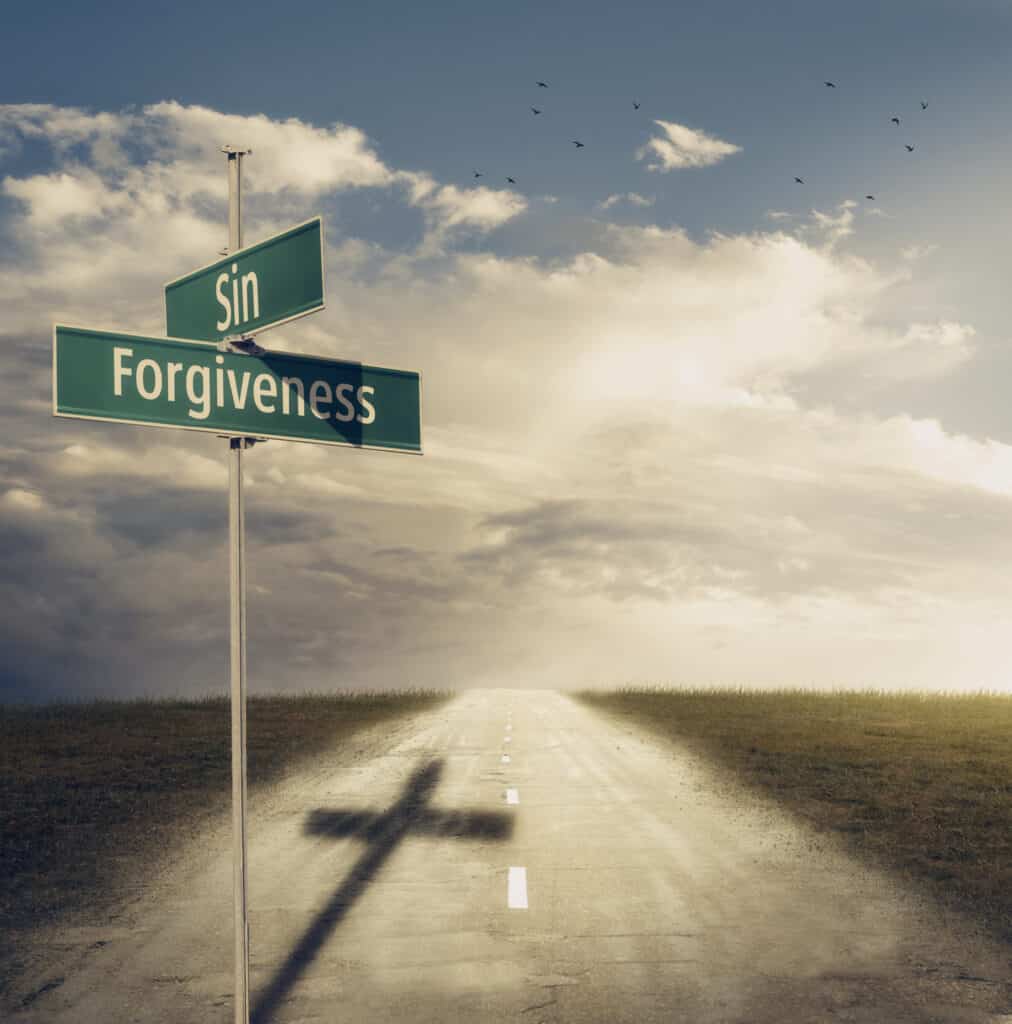
“Forgive and forget”—we’ve all heard the phrase.
In fact, we might have heard it from people who want us to forgive them.
But is that what forgiveness is? Trying to forget what happened and wiping the slate clean?
In the Bible, God declares that He “blots out your transgressions” and “will not remember your sins” when you repent and ask for forgiveness (Isaiah 43:25, ESV). It’s one of the ways we experience His limitless love and mercy.
But does that really work between humans? Or when forgiving ourselves?
While it’s always important to forgive, it does not always mean we have to act as if nothing happened. Forgiveness doesn’t require the removal of consequences or denying that trust was broken.
And sometimes, for the sake of safety or mental health, the forgiveness process has to happen without pursuing reconciliation with the wrongdoer.
It’s a delicate balance. So to help navigate this tricky topic, let’s explore:
- How God forgives and how we forgive
- Bible examples—did forgiveness involve forgetting?
- Does forgiveness remove consequences?
- How to truly forgive—even if you can’t forget
- God’s promises to help us heal
We’ll begin by looking at forgiveness in two different ways: how God forgives (our ultimate example) and the human process of forgiveness.
And the foundational definition will remain the same. Forgiveness is an agreement (and an internal decision) to move on from an incident in which pain was caused and trust was broken.
How God forgives and how humans forgive

God’s forgiveness is perfect and complete. And while He certainly feels pain and sadness when His children fail to love Him and others, He’s not vulnerable like we humans are. He is the one who guides us as we repent and move on. He is the one who can “cleanse us from all unrighteousness” (1 John 1:9, NKJV).
So God is able and willing to “forget” the sins we confess to Him. He is said to “cast all our sins into the depths of the sea” (Micah 7:19, CSB). Or as Isaiah expressed, “You have thrown all my sins behind Your back” (Isaiah 38:17, CSB).
In other words, He’s not looking at them anymore when He looks at you.
As far as the east is from the west, so far has He removed our transgressions from us
Psalm 103:12, CSB
Ideally, human forgiveness would be just like God’s forgiveness. But since we’re not perfect like God, we need His help to forgive.
We are vulnerable. We aren’t the ones doing the guiding or “cleansing” of the ones who hurt us. So God doesn’t ask us to outright forget. Only to forgive.
We start by letting go of any desire to see someone suffer for the harm they caused us. We release any grudges or bitterness so we can move on and grow.
It’s about realizing that we’re all sinful, we all do regrettable things, and people don’t have to be defined by their wrongdoings.
But while God can forgive us in an instant, the process usually takes longer for us to forgive someone else. Even after we make the choice to forgive someone, it can take time for the pain to heal.
Think about it like this:
When someone hurts us deeply, even though we’ve let go and are starting to move on, it may be a while before we can talk to them again. It may be a while before we spend time with them again. And it may be even longer before we can trust them again.
In cases of abuse, trust is a privilege the wrongdoer may have permanently lost.
And that’s appropriate.
What matters is that we make the decision to forgive. Then God promises to help us heal.
We may never forget what was done to us. But by drawing strength and love from the Holy Spirit, we strive to forgive anyway.
Bible examples—did forgiveness involve forgetting?

Jesus said that we should forgive others “up to seventy times seven” after Peter asked if he should forgive someone “up to seven times” (Matthew 18:21–22, NKJV).
But does forgiving repeat offenders mean we have to let them keep hurting us?
No.
It’s also important to remember that forgiveness isn’t synonymous with instant reconciliation or the removal of all consequences.
The forgiveness process can work a lot like a bankruptcy settlement. Ideally, once the paperwork is done, a person’s debts are forgiven.
But are all consequences removed? And are all relationships instantly restored?
Not exactly. Even though the person no longer has to pay their debts, their credit score drops. And the creditors that forgave the debt are not going to loan them money again anytime soon.
To be eligible for credit again, they’ll have to prove their trustworthiness.
And we can find these same stepping stones of forgiveness in the Bible.
Joseph’s eventual forgiveness of his brothers
(For the whole story, read Genesis chapters 37–50.)
Joseph was one of 12 brothers. He was the firstborn of his father Jacob’s favorite wife, Rachel. So he was extravagantly favored. And as you can imagine, his brothers grew jealous and angry.
Things got so bad that his brothers plotted to get rid of him. They tied him up and sold him as a slave to a caravan of traders.
It was an awful, unfair situation. But God was with Joseph.
The traders sold him to Potiphar, a high-ranking Egyptian official. Potiphar saw how faithful Joseph was in every task he gave him, so he eventually promoted Joseph to oversee his whole household.
But more hardships were on the way.
While Joseph was faithfully doing his job, he ended up attracting the attention of Potiphar’s wife. When he refused her advances, she told Potiphar that Joseph tried to hurt her. So Joseph was thrown in jail.
How infuriating! He had every right to be indignant. Yet by God’s grace, Joseph didn’t let that make him bitter.
In fact, while in jail, Joseph’s level-headedness and wisdom won the respect of the guards, and they put him in charge of the jail!
Then he ended up helping two prisoners by praying to God for the interpretation of their dreams. One of them, a man who used to work for Pharaoh, was released. So Joseph asked if the man could plead for his release.
Well, the former prisoner forgot about it. For a couple years.
Again—how frustrating!
But when Pharaoh had a troubling dream he couldn’t make sense of, the former prisoner finally remembered Joseph.
After praying to God for guidance and helping Pharaoh, Joseph was offered a high-ranking job. He helped prepare Egypt for the coming famine.
Then, amid the food shortage, all the people in need of food came to Joseph because he orchestrated its distribution. And among those people were his brothers.
Just picture the scene: The very men who tried to ruin your life are standing in front of you. They don’t recognize you, and their very life is in your hands. Revenge is within your grasp.
Joseph was very emotional. He wasn’t prepared to see his brothers. But instead of instantly reacting with rage, he wanted to see if they’d changed.
Through a series of tests that showed honesty and humility, Joseph saw that they had indeed grown since the day they wronged him.
So Joseph revealed himself to them.
I am Joseph your brother, whom you sold into Egypt. But now, do not therefore be grieved or angry with yourselves because you sold me here; for God sent me before you to preserve life
Genesis 45:4–5, NKJV
In this powerful act of forgiveness, Joseph didn’t deny that his brothers did something unthinkable. He certainly hadn’t forgotten. But he had forgiven.
Joseph said to them, ‘Do not be afraid, for am I in the place of God? But as for you, you meant evil against me; but God meant it for good, in order to bring it about as it is this day, to save many people alive. Now therefore, do not be afraid; I will provide for you and your little ones.’ And he comforted them and spoke kindly to them
Genesis 50:19–21, NKJV
And take note—this forgiveness didn’t happen quickly. God helped Joseph grow over several years, away from the tense relationships with his brothers, teaching him to rely on Him.
And when Joseph saw his brothers years later, the emotions came back. Then, even when he was ready to forgive, he proceeded with caution. He only trusted them after putting their honesty to the test.
David and Saul: forgive, but protect yourself

Let’s also look at the story of David.
He was just a young shepherd when he killed Goliath. This was meant to reveal how God, with His power, can use anyone to do anything. But when King Saul heard about this, he felt threatened.
Saul exhibited inclinations toward jealousy and depression, and it seems that this victory from David put him over the edge. His mental health was not stable. So his advisors tried to lift his spirits—and called in David to play the harp.
But as he was playing, Saul threw a javelin at him!
David escaped (1 Samuel 18:11) and from then on did his best to stay out of the king’s way.
Saul didn’t give up, though. He tried several roundabout ways to have David killed. He sent him on impossible missions against the Philistines (1 Samuel 18:17, 25), and when that didn’t work, he tried to pin him to the wall with a spear (1 Samuel 19:9–10).
Finally, David ran away. He realized that reconciliation wasn’t possible. He knew he shouldn’t stay in a situation where he’d be mistreated, so he distanced himself.
The next few chapters of 1 Samuel cover even more instances of Saul pursuing David.
During one of those times, Saul stopped to rest in a cave. The same cave David and some of his men were hiding in!
David’s men encouraged him to kill Saul. After all, this guy had been relentlessly trying to kill him.
But David refused. Instead, he “arose and secretly cut off a corner of Saul’s robe” (1 Samuel 24:4, NKJV).
When Saul left the cave, David called to him. He held up the piece of fabric from his robe, showing him that he could have killed him. Saul wept and said to David, “You are more righteous than I; for you have rewarded me with good, whereas I have rewarded you with evil” (1 Samuel 24:17, NKJV).
What a confession! All from a king who, mere hours ago, wanted him killed.
But even with that, God didn’t tell David to go back to Saul. So he kept his distance. Though confession and forgiveness happened, the relationship was still not mended. No need to put himself back in the presence of his past abuser.
Forgiveness is what kept David from killing King Saul when he had a perfect opportunity.
Remembering is what kept David from going back with King Saul to live in the palace.
Clearly, though it can be difficult, it’s in our best interest to forgive. For our own mental health and healing, it’s important to let go of the bitterness that can lead to hatred.
However, it’s not in our best interest to allow abuse or unkindness to continue. Or to put ourselves in harm’s way.
We can remember these words, assuring us that God has things handled:
Friends, do not avenge yourselves; instead, leave room for God’s wrath, because it is written, ‘vengeance belongs to me; I will repay,’ says the Lord
Romans 12:19, CSB
God doesn’t ask us to forget. He asks us—and helps us—to lay aside the resentment or ill will toward our wrongdoers.
But what about those who wronged us? Does forgiveness mean they’re absolved of responsibility?
Does forgiveness remove consequences?

God has endless patience and immeasurable grace. There are stories in the Bible of God prolonging the natural consequences of human error. And there were times when He gave people several more chances than we might have.
But there’s no story of God forgiving someone, then letting them go on as they please, forevermore, with no natural consequences for their actions.
Here are a few examples of how God has worked with those who were forgiven.
David and Bathsheba (2 Samuel 11–12)
While we don’t need to go into all the details here, this is a story of a man who was regarded as a moral, upright, humble king. We read earlier about how he spared Saul’s life and followed God consistently.
But even David fell into destructive temptations. At the peak of his power as a king, he ended up taking Bathsheba, the wife of one of his faithful soldiers—and then had this soldier killed after finding out she was pregnant.
After Bathsheba mourned her husband, King David made her his wife.
The prophet Nathan shows up and tells David a story about a rich man with many sheep, and a poor man with only one beloved lamb.
The rich man had a party and needed to kill a sheep to feed his guests, but he didn’t want to use one of his own. So he sent for the poor man’s only lamb, then had it slaughtered and prepared for dinner.
David was furious.
As the LORD lives, the man who has done this shall surely die!
2 Samuel 12:5, NKJV
Then Nathan said to David, ‘You are the man!
2 Samuel 12:7, NKJV
And then it hit him. David saw himself as God saw him. He realized he could no longer cover his sin.
“I have sinned against the LORD,” he told the prophet (2 Samuel 12:13, NKJV).
David confessed heartfelt prayers of repentance, one of which is recorded in Psalm 51. And God forgave him.
But several consequences remained. And Nathan communicated these to David.
The sword shall never depart from your house, because you have despised Me
2 Samuel 12:10, NKJV
I will raise up adversity against you from your own house
2 Samuel 12:11, NKJV
The child also who is born to you shall surely die
2 Samuel 12:14, NKJV
God loved David and forgave him. He spared his life when David knew he deserved to be put to death for such a thing.
So David never forgot what he’d done, and he dealt with the awful consequences of his actions. He lived on, knowing full well that it was God’s grace that was sustaining him.
The thief on the cross

Another powerful story of forgiveness involves the two thieves crucified next to Jesus right before He died.
On one side, a hardened criminal taunted Jesus: “If You are the Christ, save Yourself and us” (Luke 23:39, NKJV).
The other man cautioned his fellow criminal: “Do you not even fear God, seeing you are under the same condemnation? And we indeed justly, for we receive the due reward of our deeds; but this Man has done nothing wrong” (Luke 23:40–41, NKJV).
Looking at Jesus Christ, he said, “Lord, remember me when You come into Your kingdom” (Luke 23:42, NKJV).
In that moment, Jesus offered this man forgiveness. He assured him that he would have a place in the kingdom.
But this criminal was hours away from dying because of his crimes. Jesus didn’t save him from his sentence, but He did give him the promise of eternal life (Luke 23:43).
He removed the eternal consequences of sin from this man, but not the immediate consequences.
Philemon and Onesimus
This next story about forgiveness is a little different.
Onesimus was a “bondservant” to Philemon, required to work for him for life. He escaped and might have stolen some money on the way out. He eventually found the apostle Paul in prison, and they became friends.
Paul knew that Onesimus ran away from Philemon, but he didn’t report him right away. They spent time together, and he became like a son to Paul.
It was a sticky situation from our perspective. Onesimus was basically a slave. So it’s not hard to see why he’d want to escape indentured servitude. But Paul knew he had to return to Philemon. And a wonderful blessing and lesson could come out of this.
Paul wrote to Philemon, telling him that he was sending Onesimus back. But even though Onesimus had run away, Paul encouraged Philemon to accept Onesimus back “no longer as a bondservant but…as a beloved brother” (Philemon 1:16, ESV).
And he doesn’t stop there: “If he has wronged you or owes anything, put that on my account” (Philemon 1:18, NKJV).
So to facilitate this reunion, as well as the potential growth of Onesimus from a slave to a family member, Paul offers to take on any debts Onesimus might owe. All in the name of reconciliation.
Sound familiar?
That’s like what Jesus did for us on the cross. He took on any debts we would owe God, just because we’ve sinned even once.
And though Philemon was asked to forgive, and even to accept his runaway servant with higher regard than before, he did not have to relinquish any money he was owed. Paul took care of it.
Forgiveness doesn’t mean you have to be willing to part with whatever was taken from you. Instead, forgiveness is about the relationship. If reconciliation is possible, safe, and realistic, it’s about moving forward and removing resentment.
But it still hurts. How do I forgive if I can’t forget?

Forgiveness would indeed be easier if it came with a free memory-wiping device. All that hurt, betrayal, disappointment—erased.
But then, would it really be forgiveness?
When wounds are fresh, be they physical or emotional, forgiveness can feel impossible. But our all-powerful and loving God can help us out of even the darkest pits of despair.
Moving on from hurt, instead of dwelling in our pain, takes time, strength, love, and growth. And amid these things is where the healing happens.
Forgiveness, rather than forgetting, is what truly releases us from the prison of anger and bitterness that can end up destroying our lives. And it’s one of the most amazing manifestations of perfect love, as ultimately demonstrated by our Savior, Jesus Christ.
God’s promises to help us heal

It’s no question we live in a sinful world. Several times in our lives, we’ll find ourselves needing forgiveness or needing to forgive.
But God never forgets His hurting children. And He has some incredible promises that confirm His care for us.
- God notices when we’re hurting, even if we don’t say it. “You number my wanderings; put my tears into Your bottle; are they not in Your book?” (Psalm 56:8, NKJV)
- God shares in our afflictions and knows what we’re going through. “In all their affliction He was afflicted, and the Angel of His Presence saved them; in His love and in His pity He redeemed them” (Isaiah 63:9, NKJV).
“For we do not have a high priest who is unable to sympathize with our weaknesses, but one who in every respect has been tempted as we are, yet without sin” (Hebrews 4:15, ESV).
- God cares about justice and ultimately makes sure it’s carried out. “It is written, ‘Vengeance is Mine, I will repay,’ says the Lord” (Romans 12:19, NKJV).
“A false witness will not go unpunished, and he who breathes out lies will not escape” (Proverbs 19:5, ESV).
- God hates to see His children suffer. “Whoever causes one of these little ones who believe in Me to sin, it would be better for him if a millstone were hung around his neck, and he were drowned in the depth of the sea” (Matthew 18:6, NKJV).
- God wants to carry our worries for us. “Humble yourselves, therefore, under the mighty hand of God so that at the proper time He may exalt you, casting all your anxieties on Him, because He cares for you” (1 Peter 5:6–7, ESV).
- God promises to give us strength for what we’re facing. “I can do all things through Christ who strengthens me” (Philippians 4:13, NKJV).
And if we want to reach out to God for help, but we just don’t have the words, we can use the words of repentant King David:
Hear my cry, O God; attend to my prayer. From the end of the earth I will cry to You, when my heart is overwhelmed; lead me to the rock that is higher than I. For You have been a shelter for me, a strong tower from the enemy
Psalm 61:1–3, NKJV
Want to learn more about the love and forgiveness of God? Start your own online Bible study.